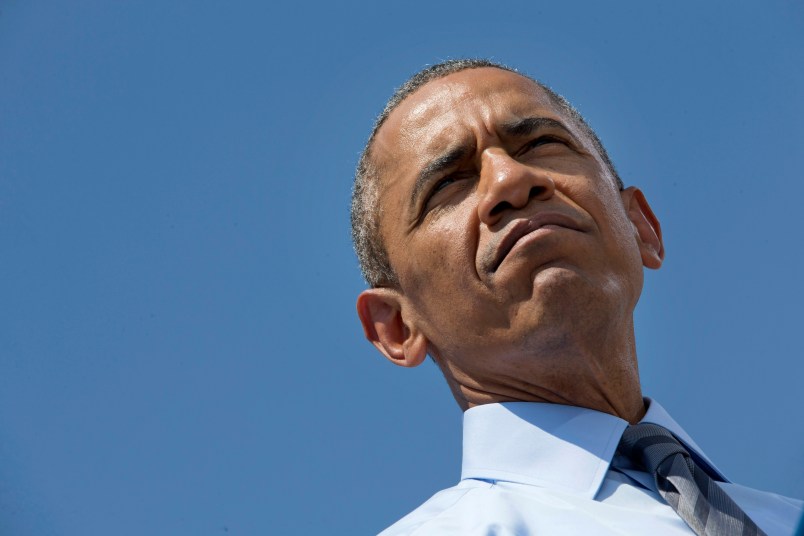The Obama administration caught a glimpse of the worst-case scenario for the president’s signature health care law on Tuesday in a ruling by a federal appeals court in Washington, D.C.
The ruling will be appealed, but even if it ends up being upheld, policy experts told TPM that it might be fairly easy for the administration to craft a workaround to keep a key piece of the law from falling apart.
The D.C. federal appeals court initially appeared to throw a stunning legal blow to Obamacare with its decision to invalidate financial subsidies offered through HealthCare.gov. The loss of those subsidies could affect 4.7 million people and send premiums skyrocketing. But the ruling was quickly tempered by a separate appeals court ruling that upheld the subsidies in another case.
Either way, the legal case is far from over and likely to work its way through another court panel or two before possibly heading to the Supreme Court.
The experts told TPM that the mechanics of how the workaround could be done aren’t completely clear, but the crux would be this: States could continue using HealthCare.gov but pass a bill or otherwise indicate that the website functions as their state-based insurance exchange. Creating a website from scratch had been one of the biggest impediments to states creating their own exchanges.
But with HealthCare.gov now built, states could latch onto it as their technical platform and avoid having many of their citizens pay higher premiums because they don’t have a state-based exchange.
Joel Ario, a former Health and Human Services official who nows works at Manatt, Phelps and Phillips, told TPM that HHS Secretary Sylvia Mathews Burwell “could make it much easier for a second generation of state exchanges to be established now that the federal government has a viable IT platform for both state and federal exchanges to use.”
Ario noted that Oregon and Nevada, two state-based exchanges, planned to connect with HealthCare.gov in 2015 after their own software failures this year.
White House and HHS officials declined to comment on whether any such contingency planning had taken place. But similar solutions were offered by other outside experts.
“I imagine the administration would try to make it as easy as possible for states to set up exchanges, possibly including having the nuts and bolts still operated through HealthCare.gov,” Larry Levitt, vice president at the non-partisan Kaiser Family Foundation, told TPM.
“If the ruling were upheld, the Administration is likely to pursue a fix that would circumvent the court decision,” Caroline Pearson, vice president at Avalere Health, an independent consulting firm, told TPM by email. “One such scenario would be for HHS to effectively deem all of the exchanges to be state-based, but continue operating them through HealthCare.gov.”
Such administrative action might still require some action by the states. They might, for example, have to file some kind of paperwork with HHS, Pearson said. The National Review reported that one health policy expert at Duke University estimated that as many as 20 states would be willing to pass legislation stating that HealthCare.gov functioned as their state exchange.
It’s possible these administrative fixes could also be subjected to legal challenges, though Pearson said that a legally permissible way to address the problem probably exists.
However it happens, experts agreed that the 36 states using HealthCare.gov would face significant pressure to do something. As many as 4.7 million people would stand to lose financial help under the law if the subsidies were prohibited.
“With this obstacle removed, pressure would be intense on governors to act to keep tax credits flowing and avoid huge disruption for consumers and providers,” Ario told TPM.







If the Governors were interested in doing the right thing, they’d already have exchanges and the issue would be moot. Never underestimate the power of victim hating.
With Republicans in our country – Who needs terrorist?
WOw, talk about clueless stupidity. These states did not want to support Obamacare. That’s why they said “let the feds do it”. In SD where I live there is no way, not a single possible way, that the state would vote to authorize such a thing. Can we get a little political realism at TPM, please?
Some of these states didn’t approve Medicare expansion. That kind of tells you what their governors care about. Hint: it isn’t their citizens.
Many of the rejectionist states have ALREADY, albeit unintentionally, designated Healthcare.gov as their de facto exchanges. In any event, if the White House and the Democrats, including candidates for State Legislative elections as well as Congressional elections, play this right, it could end up for the Republicans as a Pyrrhic victory to end all Pyrrhic victories.